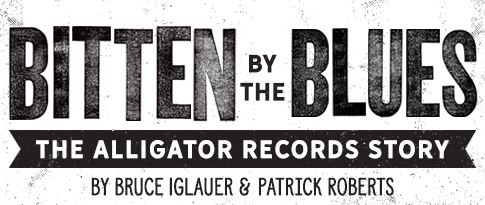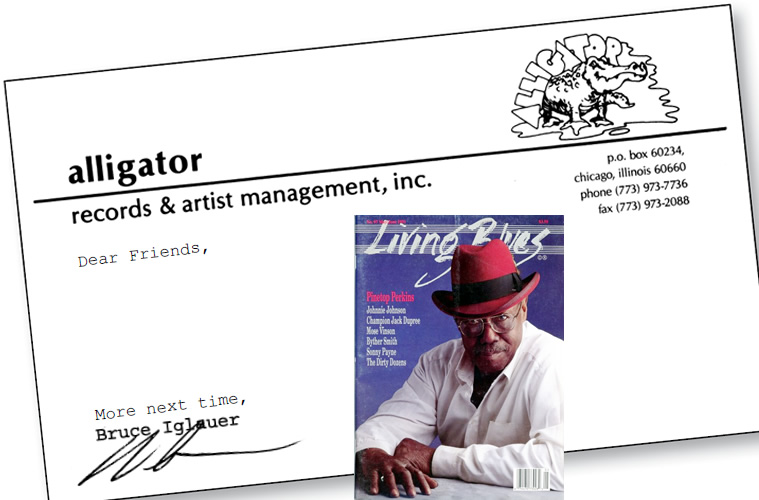Dear Friends,
I’m flying to Toronto tomorrow to do interviews to promote our ALLIGATOR RECORDS 20TH ANNIVERSARY COLLECTION. We’re distributed in Canada by Warner Music (that’s right… we’re in collusion with one of them there big “major” labels, and boy do they do a good job for us). Joining me in Toronto will be Saffire – The Uppity Blues Women, which leads neatly into telling you that Saffire has a brand new album. It’s called HOT FLASH and we recorded it in December right here in Chicago. Their last album was self-produced and all I got to do was mix a couple of cuts.
This time I had the fun of working with The Uppity Blues Women in the studio. We cut sixteen (1!) songs in four days, close to an hour of music. Ann Rabson really had a chance to stretch out on piano, and she proved herself to be one of the finest two-fisted blues and boogie players on the scene today. Gaye Adegbalola contributed her trademark down-and-dirty vocals and some wonderful and wise songwriting. The opening song (written by Gaye) is entitled “Two In The Bush Is Better Than One In the Hand” (need I say more?) Earlene Lewis stepped into the vocal spotlight for four songs, including a Ukulele Ike classic called “Mr. Insurance Man (Please Take Out That Thing)”. But don’t think every tune on the album is funny or bawdy. There is some SERIOUS blues on HOT FLASH. Many of you have seen Saffire live, especially since they started touring nationally after their debut album. If you like them live, you won’t be disappointed by HOT FLASH.
Along with HOT FLASH, we’re releasing a rare Otis Rush album cut in Sweden back in 1977. These tracks were originally released in Europe by my friends at Sonet Records on an album called TROUBLES, TROUBLES. I’ve remixed the entire album for Alligator re-release, including bringing in Otis’ favorite keyboard man, Lucky Peterson, to fill out the sound. Lest you think I’m perverting Otis’ artistic vision, you should know that he always planned to add additional instrumentation to these songs. He just didn’t know it would be fourteen years later! I don’t have to tell LB readers anything about Otis, but you’ll be happy to know that all the material on this album (which is also Otis’ last released studio recording as a leader) are songs that Otis never cut for another label, so if you own Otis’ more recent live albums, you won’t be getting any of the same tunes. As befits a “deep blues” man like Otis Rush, the new album is called LOST IN THE BLUES. By the way, both Otis and Saffire – The Uppity Blues Women, will have a small pressing in vinyl (about 1200 copies), so if you’re a vinyl LP junkie, get them soon!
Now, to continue with my tale of recording Professor Longhair. Back in 1979,
I was helping my friend Perry Aberli (where is he now?) organize the annual Midwest Blues Festival at Notre Dame University in South Bend, Indiana. He asked me to get ahold of Professor Longhair. I called Allison Kaslow (now Allison Miner), who was managing “Fess” while her husband, Andy, was leading his backup band. I had tried to sign Fess three years before, but his manager of the time was convinced that a major label contract was just around the corner, and didn’t want to deal with a little independent. After chatting with Allison about the Festival, I mentioned that I would still love to sign Fess to Alligator. Much to my amazement, she called back the next day asking me to make an offer! I told her that first I’d like to hear his present band and repertoire, and she told me that he was playing that weekend at Tipitina’s (where else?). That was a Tuesday, and Friday I was sitting in New Orleans’ most famous club, trusty notebook in hand, listing every song I heard. Before the end of the weekend, Allison, Andy, Fess and I had mapped out a plan to cut an album! I was elated. But yet another wonderful and unexpected thing happened –my old pal Tad Jones, who is one of THE New Orleans music experts, called his old pal, Dr. John. Tad mentioned that we were getting ready to cut, and the Doctor insisted on being involved. As we obviously didn’t need a piano player, he suggested he return to his first instrument, guitar. Of course, Fess was Dr. John’s teacher and mentor, and I couldn’t imagine a better idea than uniting them in the studio.
More next time,
Bruce Iglauer

